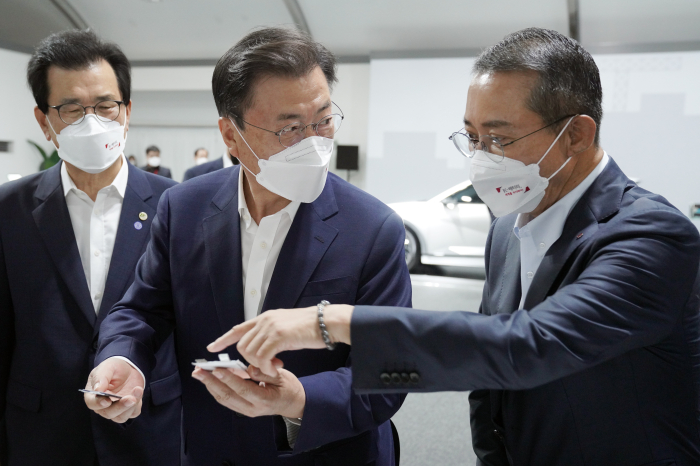EV batteries
LG Group's No. 2 exec Kwon to head EV battery unit
LG Energy Solution logs Q3 operating loss of 372.8 bn won, outweighed by 623 bn won reserves against GM EV recall
By Oct 25, 2021 (Gmt+09:00)
3
Min read
Most Read
Samsung shifts to emergency mode with 6-day work week for executives


CJ CheilJedang to sell feed, livestock unit for $1.4 bn


Samsung Electronics' key M&A man returns; big deals in the offing


Affinity to buy SK Rent-a-Car at $572 mn, more deals expected


Keppel REIT to sell Seoul-based prime office T Tower



Kwon Young-soo, the No. 2 leader of South Korea's LG Group, will be appointed as the chief executive officer of LG Energy Solution Ltd. next month, the company said on Monday.
The incoming CEO, co-chief executive of LG Corp. along with group Chairman Koo Kwang-mo, is expected to push forward with the battery maker's initial public offering shelved after the recall of General Motors' electric vehicles equipped with LG's battery cells this year. For the recall, the LG Group agreed earlier this month to reimburse $1.9 billion to the US carmaker.
LG Energy Solution, 100% owned by LG Chem Ltd., will name Kwon as CEO at its extraordinary shareholder meeting on Nov. 1. Its incumbent CEO Kim Jong-hyun is stepping down, after leading the EV battery unit since its split-off from LG Chem early this year.
"His appointment demonstrates Chairman Koo's intention to appoint the most trustworthy manager to proactively prepare for the future, as well as showing his trust in Kwon," the company said in a statement.┬Ā
Kwon had led LG Chem's battery business division between early 2012 and end-2015. Now he is the No. 2 leader after group Chairman Koo Kwang-mo. He took the helm of LG Group in June 2018 as the fourth-generation leader from the owner family.
"Vice Chairman Kwon has a good understanding of and a sharp insight into the battery business," LG Energy said. "He, as a chief executive, will be able to win high levels of trust from not only consumers and investors, but also interested parties.
As he is taking office as LG Energy Solution CEO next month, Kwon will resign from his other positions within the group, including as chief operating officer (COO) of LG Corp. and a board director at other major LG Group units. LG Corp., the group's holding company, has yet to find his replacement for the COO position.
THIRD-QUARTER LOSS
The country's top battery maker had planned to go public later this year. But the plan went awry after GM said in mid-August that it was recalling the Chevy Bolt EVs equipped with batteries supplied by LG due to fire risk after some of the vehicles caught fire.
┬Ā
Earlier this month, LG agreed to reimburse GM for nearly all of the $2 billion costs of recalling Chevrolet Bolt electric models.┬Ā
For the recall, LG Energy booked 623 billion won in loss reserves in the July-September quarter. This led to its third-quarter operating loss of 372.8 billion won on sales of 4 trillion won.
As the EV market takes shape, competition is intensifying among battery makers. In particular, Tesla Inc.'s announcement last week that it is using lithium iron phosphate (LFP) batteries, cheaper models, in all its standard-range EVs, is expected to trigger a shake-up in the battery industry, as it will give it an edge over Chinese rivals.
South Korean battery makers, including SK On and Samsung┬Ā SDI Co., do not produce LFP batteries, which boast high safety levels at lower prices relative to high-nickel battery cells, though with a shorter battery run time.
LG Energy Solution will this year begin the production of high-nickel batteries made of nickel, cobalt, manganese and aluminum (NCMA), which offer longer mileage and shorter charging time than existing batteries.┬Ā
This month, LG Energy Solution Ltd. and multinational automaker Stellantis N.V. signed a preliminary agreement to launch a 4 trillion won joint venture to build a battery manufacturing facility in the US targeting the fast-growing North American EV market.
Additionally, LG Energy and GM said in April that they would spend 2.7 trillion won to build their second US EV battery plant in Tennessee through their joint venture, Ultium Cells LLC, in order to double the JV's EV battery output in the US.
Write to Hyung-suk Song at click@hankyung.com
Yeonhee Kim edited this article.
More to Read
-
 EV batteriesLG Energy, Stellantis to launch $3.4 billion EV battery JV in US
EV batteriesLG Energy, Stellantis to launch $3.4 billion EV battery JV in USOct 18, 2021 (Gmt+09:00)
4 Min read -
 IPOsLG Energy SolutionŌĆÖs IPO plan remains elusive after GM recall settlement
IPOsLG Energy SolutionŌĆÖs IPO plan remains elusive after GM recall settlementOct 13, 2021 (Gmt+09:00)
3 Min read -
 Auto industryGM says it will recover $1.9 billion of Bolt-recall costs from LG
Auto industryGM says it will recover $1.9 billion of Bolt-recall costs from LGOct 13, 2021 (Gmt+09:00)
2 Min read
Comment 0
LOG IN


